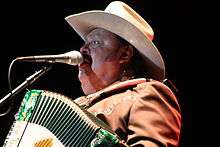Ramón Ayala
| Ramón Ayala | |
|---|---|
 Ayala in 2012 | |
| Background information | |
| Birth name | Ramón Covarrubias Garza |
| Born |
December 8, 1945 Monterrey, Mexico[1] |
| Genres | Norteño, Corrido, Conjunto, Tejano |
| Instruments | Accordion |
| Years active | 1963–present |
| Labels | Freddie Records[2] |
Ramón Covarrubias Garza (born December 8, 1945) known by his stage name Ramón Ayala is a Mexican musician, composer and songwriter of Norteño and Conjunto music. Known as the "King of the Accordion," Ayala has recorded over 113 albums for which he has received four Grammy Awards. Additionally, Ayala has been featured in thirteen movies. A legend of norteño music, Ayala is one of the most recognized and best-selling artists of this genre of Mexican music, breaking many sales records along the way.
Biography
Ayala, born December 8, 1945, en Reynosa, Mexico, is a master accordionist, vocalist and songwriter with a career that spans over 50 years. Ayala has defined norteño music with signature songs and a definitive instrumental style that have made him a superstar on both sides of the Rio Grande. Ayala, son of local musician Ramón Cobarrubias, began playing his favorite instrument, the accordion when he was five years old. Inspired and supported by his parents, he performed in different public places to help his modest family. His first band experience was a group called Los Jilgueros de Marin; later he joined Los Pavorreales. As a teenager in the early 1960s, Ayala virtually invented modern conjunto music, teaming up with the late bajo sexto guitarist/vocalist Cornelio Reyna to form Los Relámpagos del Norte.
The duo forged a distinctive sound and compiled a roster of songs that have since been covered by countless artists in contemporary Latin music. Their first hit single, "Ya No Llores" was recorded in 1963. For the next eight years, Los Relámpagos del Norte tore up the music charts by revolutionizing and re-inventing norteño music, a genre that was then considered exclusively cantina music. Ayala and Cornelio livened the music and lyrics in order to reach and appeal to more people. The talented duo recorded a total of 20 albums, leaving behind many classics.
After Cornelio Reyna left to pursue his own ranchero career in 1971, Ayala set out to prove that he could make it on his own and formed the legendary band Ramón Ayala y Sus Bravos del Norte in late 1971. Early the next year, Ayala was growing and already making a name for himself with his new vocalist, Antonio Sauceda. Changes were yet to come. Antonio Sauceda showed a renewed interest in Christianity and decided to join a Christian seminary. This time, Eliseo Robles joined the band, leaving behind the Satellites de Fidencio Ayala (Ramón Ayala’s brother). Together, Ayala and Eliseo forged a partnership that artistically surpassed all others and that to this day still remains as the premier perfection of the genre. They created a style that became the standard for norteño music. During the Eliseo Robles years, Ramón Ayala y Sus Bravos del Norte’s album sales reached peak high in Mexico and the United States with hits such as "Un Rinconcito En El Cielo" and "Chaparra de Mi Amor" among others. In the mid-1980s, Ayala again found himself without a lead singer. Eliseo's ego caused him to leave the band. Antonio Coronado became the fourth lead singer and although it looked like it was going to be a successful addition, the same ego problems appeared and he only recorded 8 albums with the group. In 1993, Mario Marichalar became the group's fifth and current lead singer. Mario Marichalar brought a new style to the band, appealing to a younger generation.
Ayala continues to be a classic musician who is remembered as one of the founders of the modern norteño music. Ayala has won and has been nominated for several Grammy awards. In 2001, Ayala was awarded with an American Grammy award for the album En Vivo: El Hombre y Su Música. Ayala has also been awarded with two Latin Grammys for the albums "Quémame Los Ojos" and "El Numero Cien."
Ayala is also known for singing "Juan Ramos" and "Lo Que Le Paso A Julian," composed and written by his friend Bonifacio "El Boni" Salinas. Ayala currently lives in Hidalgo, Texas, where he now has a street named in his honor.[3]
References
Notes
- ↑ Ragland 123.
- ↑ Barkley, Roy R. The handbook of Texas music. Texas State Historical Association. p. 261. ISBN 978-0-87611-193-2.
- ↑ http://www.univision.com/musica/regional-mexicano/la-calle-principal-de-hidalgo-texas-ahora-lleva-el-nombre-de-ramon-ayala. Missing or empty
|title=(help)
Bibliography
- Ragland, Cathy (2009). Música norteña: Mexican migrants creating a nation between nations. Temple UP. ISBN 978-1-59213-747-3.
- San Miguel, Guadalupe (2002). Tejano proud: Tex-Mex music in the twentieth century. Texas A&M UP. ISBN 978-1-58544-188-4.